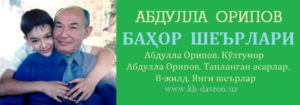SHARE WITH FRIENDS:
Abdulla Aripov was born on March 1941, 21, on New Year's Day in the village of Nekoz, Kasan district, Kashkadarya region. The village is located in the foothills of Kungurtov, and despite the scarcity of running water, it was a wide place where in the rainy years it was buried in greenery and grass. The poet himself said: “Especially in the spring there is a lot of rain, the Kungurt foothills are covered with a thousand kinds of grasses, tulips and rabbits. -u was covered with spinach, karrag-u with hazorisfand, with raisins, and the surrounding landscape was a paradise. The small lakes where the floodwaters had accumulated were called "lakes". "People used to drink its fresh water, and they used to spend their days in the foothills of Kungurtov, picking spinach and mushrooms without having to worry about children." Orifboy Ubaydulla oglu, the father of Abdulla Aripov, who was born and raised in such a beautiful place, was a business farmer and chairman of the collective farm. Her mother, Turdihol momo, like many Uzbek women, was a good-natured, hard-working, kind, very influential and kind woman. There were four sons and four daughters in the family, and Abdullah was the youngest of the sons. His childhood was spent in the same way as that of his peers in the village: he tended sheep, fetched water, cut hay, cut hay, and collected straw. At the same time, he was different: somehow imaginative, impressionable, thoughtful, overly concerned with the book. Before going to school, Abdullah liked to say some words in a sleepy way, and his tone was more captivating than the meaning of the words. The poet later recalls: “I do not know exactly what motivated me to write the first poems. At least I remember becoming a fan of rhyming words. Maybe I was bored, maybe I was overjoyed and wanted to write something. And no idea. It's impossible not to write. " Abdulla Aripov started school at a seven-year school in his village. After graduating from high school in the neighboring village of Tayzan in 1958 with a gold medal, he entered the journalism department of the Tashkent State University (now the National University of Uzbekistan), Faculty of Uzbek Philology, graduating in 1963 with honors. . After graduating from high school, Abdulla Aripov began working as an editor at the former Yosh Gvardiya publishing house in Tashkent. After working here for four years, in 1967-1974 he worked as an editor, senior editor at the publishing house named after Ghafur Ghulam. From 1974 to 1976 he was the head of the department of the magazine "Oriental Star". The poet, who won the love of his fans with his fiery poetry, from 1976 to 1982, as a literary adviser to the Writers' Union of Uzbekistan, guided young writers who were just entering the world of literature. From 1982 to 1983 he worked as executive secretary of the Tashkent regional branch of the Writers' Union of Uzbekistan. In 1983, the poet became the editor-in-chief of the student magazine "Gulkhan", where he worked until 1985, when he became secretary of the Writers' Union of Uzbekistan. Abdulla Aripov, who worked as the secretary of the association for three years, in 1988 was transferred to the position of the chairman of the Committee on Copyright Protection of the Republic of Uzbekistan. From March 1996 to 2009, the poet served as chairman of the Writers' Union of Uzbekistan. Abdulla Aripov was awarded the Hamza State Prize in 1983. In the same year he was awarded the title of "People's Poet of Uzbekistan." In 1994 he was awarded the Republican State Prize named after Alisher Navoi, and in 1998 the poet was awarded the title of "Hero of Uzbekistan." Abdulla Aripov is the author of the national anthem of the Republic of Uzbekistan. Abdulla Aripov was a student when his poem "Bird" was first published in the republican press. The poet's first collection of poems "Little Star" was published in 1965. Then he wrote "My eyes are on your way" (1967), "Mother" (1969), "My soul" (1971), "Uzbekistan", "Poem" (1972), "Memory" (1974), "My country" The Wind (1974), The Road to Heaven (1978), The Amazement (1979), The Judge and Death (1980), The Fortress of Salvation (1981), The Harmony of the Years (1983), A number of books were published, such as Hajj Daftari (1992), Saylanma (1996), Sahibqiron (1996), and the four-volume Selected Works (2000-2001). Abdulla Aripov has done a lot to acquaint our people with the best examples of world literature. He skillfully translated Dante's "Divine Comedy", poems of such poets as L.Ukrainka, T.Shevchenko, N.Nekrasov, K.Kuliev, R.Khamzatov into Uzbek.
Source https://tafakkur.net/abdulla-oripov.haqida
